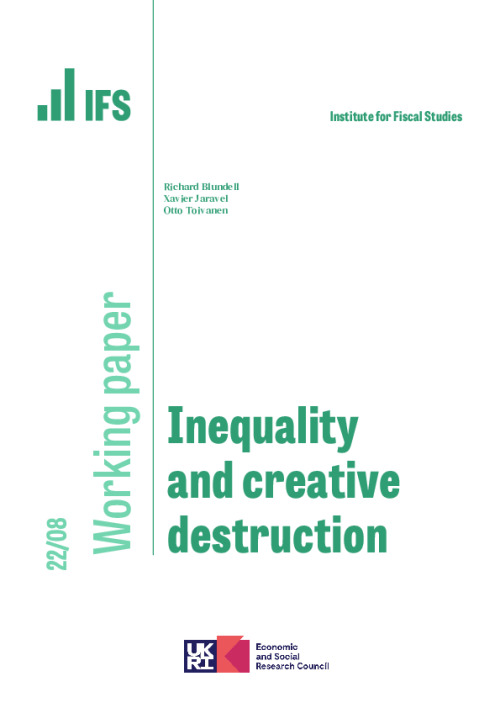Downloads

WP202208-Inequality-and-creative-destruction.pdf
PDF | 1.67 MB
In this article we review recent evidence showing how market forces and policies shape the rate and direction of innovation, with various implications for inequality. First, we characterize several market mechanisms whereby higher rates of innovation lead to higher inequality. Second, we highlight channels whereby inequality acts as an impediment to innovation and growth. Third, we highlight policies that can help achieve better outcomes for both innovation and inequality. We show that two types of policies, which are not traditionally viewed as part of innovation policy, play a key role to achieve the goal of enhancing innovation while reducing inequality: education and competition policy.
Authors

CPP Co-Director
Richard is Co-Director of the Centre for the Microeconomic Analysis of Public Policy (CPP) and Senior Research Fellow at IFS.

Research Associate London School of Economics
Xavier is a Research Associate at the IFS, an Assistant Professor of Economics at the LSE and a member of the French Council of Economic Analysis.

Otto Toivanen
Working Paper details
- DOI
- 10.1920/wp.ifs.2022.0822
- Publisher
- The IFS
Suggested citation
R, Blundell and X, Jaravel and O, Toivanen. (2022). Inequality and creative destruction. London: The IFS. Available at: https://ifs.org.uk/publications/inequality-and-creative-destruction (accessed: 30 June 2024).
More from IFS
Understand this issue

If you can’t see it, you can’t be it: role models influence female junior doctors’ choice of medical specialty
24 April 2024

Sure Start achieved its aims, then we threw it away
15 April 2024

Spring Budget 2024: What you need to know
7 March 2024
Policy analysis

How do the last five years measure up on levelling up?
19 June 2024

Universal credit: incomes, incentives and the remaining roll-out
11 June 2024

Making mortgage guarantees permanent will help some first-time buyers, but only if they can afford a bigger mortgage
6 June 2024
Academic research

Income inequality in Ireland, 1987–2019
28 June 2024

Components of the evolution of income inequality in Sweden, 1990–2021
28 June 2024

The impact of labour demand shocks when occupational labour supplies are heterogeneous
28 June 2024